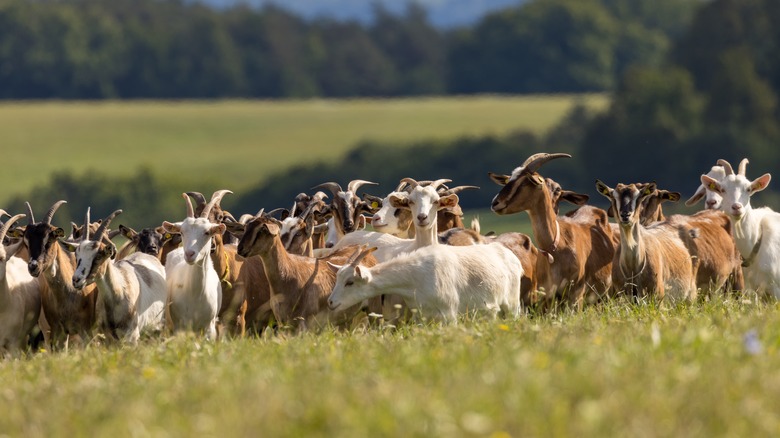The Fascinating Mythos Behind The First Cup Of Coffee
When coffee first passed through human lips, it set off a chain of events that would ultimately change the world. The energizing brew has become a vital fuel for billions of people worldwide, including 75% of the U.S. population (via The Journal of Nutrition). Coffee is one of the most-traded agricultural commodities in the world, making it the most consumed beverage in the world, and its active ingredient, caffeine, is the most widely used psychoactive substance in history. It's safe to say we're obsessed with coffee, but for such a vital cornerstone of society, we know surprisingly little about its origins.
Suspected references to coffee first appear in Arabic texts from the Islamic Golden Age, around the 10th century, though the nature of the language makes it difficult to determine if the authors are referring to coffee, or some other medicinal plant. The first verified references to coffee drinking come from the 15th century, in the region of present-day Yemen. Sufi monks used the drink to stay alert through long hours of prayer.
But, the coffee plant is not native to Yemen, nor to the Arabian Peninsula as a whole. It originated in sub-Saharan Africa and appears to have come to Yemen across the Red Sea from Ethiopia. It's unclear when and how coffee made that jump, in fact, pretty much every aspect of coffee's history before arriving in the Middle East is a mystery. All we have to go by are myths, one of which has gained particular prominence.
The legend of Kaldi the goat herder
The best-known coffee origin story is the tale of Kaldi the goat herder. Kaldi is said to have lived in Abyssinia (now known as Ethiopia) around the year A.D. 850. One day, as he was herding his goats through the highlands, he noticed a sudden change in their behavior. The typically placid animals were dancing around and bleating. When Kaldi investigated the cause of this behavior, he found his goats munching on a bush of red berries. The curious herder decided to sample the berries himself, and felt a thrilling jolt of energy, for at the core of each berry was the seed that we now call a coffee bean.
Kaldi brought the berries to a local monastery, where a monk decried them as the devil's work, and angrily threw them into a fire. As they burned, the monk caught a whiff of roasted coffee, and found it so enticing that he rushed to retrieve the berries from the fire. In trying to extinguish them, he crushed the coffee beans, and put them in hot water in hopes of rehydrating them. Thus was born the first cup of coffee, except, that's not how it went at all.
Despite being shared by countless sources, there is no actual evidence for the tale of Kaldi. It first arose in one of the first books about coffee by Antoine Faustus Nairon, a Maronite Roman professor of Oriental languages, which was published in 1671, nearly 1,000 years after the herder supposedly lived.
Other coffee origin stories
Kaldi's tale is certainly the most widespread theory regarding coffee's origin, but there are many others, all of which are equally lacking in evidence. One legend claims that coffee made its way through Africa by civets, which spread the seeds of coffee plants through their feces. While there's little evidence to back this story, civets are known to eat coffee berries, producing the controversial Kopi Luwak coffee.
Yemeni folklore offers a couple of coffee origin stories, one of which identifies Ethiopia as the plant's original home. It's said that a Sufi mystic was on a spiritual journey in Ethiopia when he saw a flock of birds pecking at a bush of red berries. He was weary from his travels, and tried some of the berries himself, discovering their potent powers.
Another tale claims that a Sheik from the Yemeni city of Mocha was exiled by the king, and was wandering through the mountains, close to starvation. Coming across a coffee bush, he sampled the berries and found them unbearably bitter, so he tried roasting and boiling them, thus creating the first cup of coffee. In some versions of the story, the Sheik calls out to the spirit of his master for help, and a bird descends from the sky with a branch of coffee berries. Still, other versions say that the Sheik enjoyed the taste of the berries, and that the first cup of coffee was a soup he made.
The word coffee may be tied to this mythos
The origin of coffee's name is almost as mysterious as that of the beverage itself. One possible explanation is linked to the legend of Kaldi, who is said to have lived in the Ethiopian region of Kaffa. The name is pretty close to coffee, and even closer to terms used in other languages, like the German "kaffe". Were Kaldi's story true, this would be the likely origin of the beverage, but just as his tale lacks evidence, there is no concrete proof that coffee was named for this reason. Then again, there's no proof that it wasn't.
The word "coffee" has Arabic origins (Ehtiopians call it "būno"), and while it's possible that Arabs named it after its native region, other explanations have been proposed. The word "coffee" came to English via the Turkish word "kahve," which comes from the Arabic "qahwa". It's thought that, long ago, qahwa meant wine, but since alcoholic beverages are forbidden by Islam, coffee became known as the wine of Arabia.
There is one part of the coffee mythos that is tied to the name. That Starbucks mocha you love so much was named for the Yemeni city of Al-Mukhā, also known as Mocha, which has long been a critical port for the coffee trade. You might recall that the fabled Sheik Omar was said to come from Mocha, and whether he truly existed or not, his hometown certainly played a major role in coffee's origins.



